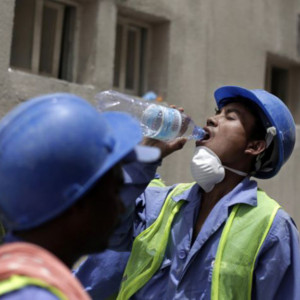Nepalis are returning from Middle East with renal failure, cardiac issues and other ailments in alarming numbers

Lal Singh Gharti Magar was in a rush on Thursday afternoon to reach the National Kidney Centre as he had taken an appointment there for his dialysis.
Since returning from the United Arab Emirates in 2018, Gharti has been undergoing dialysis thrice a week.
“I am in a little hurry at the moment, as I have to reach the dialysis centre on time,” said the 39-year-old Gharti Magar. “I have shortness of breath and if I miss the dialysis session, it will be difficult for me.”
This was a common refrain among the dozens of migrant workers who had returned from the Middle East and Gulf countries after suffering renal failure and have been undergoing dialysis at Vanasthali-based National Kidney Centre.
A new report “Killer Heat: The Impact of Extreme Temperatures and Climate Change on Migrant Workers in the Gulf”, unveiled on Tuesday, states that the extreme and rising temperatures in the Gulf countries are placing migrant workers across the region at an acute risk of potentially fatal heat-related illnesses and injuries.
“Long-term exposure to extreme heat leads to chronic health problems, which require lifelong treatment,” said the report.
The World Health Organisation says that exposure to excessive heat has wide-ranging physiological impacts on all humans, often exacerbating existing health conditions and resulting in premature deaths and disabilities. Extended periods of high day and night time temperatures create cumulative stress on the body, and can exacerbate the impact of respiratory and cardiovascular diseases, diabetes and kidney diseases. A rapid rise in body heat due to exposure to hotter-than-average conditions compromise the body’s ability to regulate temperature and can result in what the WHO describes as “a cascade of illnesses”, including heat cramps, heat exhaustion, hyperthermia and heat stroke.
“Over six dozen people who returned from the Middle East and the Gulf after suffering from renal failure have been undergoing dialysis at our centre,” Bimal Baral, deputy administrative director at the Centre, told the Post. “The number of renal patients seeking dialysis at our Centre alone is huge [around 700] and among them, people who once served as migrant workers in the Middle East are in significant numbers.”
Doctors at the centre attributed exposure to excessive heat, dehydration, and the trend of having energy drinks immediately after returning from work as the main culprits for renal failure.
“Continuous exposure to excessive heat, chronic dehydration [a condition when dehydration recurs for longer periods], and harsh work environment could be responsible for high renal failure and other health-related problems in migrant workers,” said Dr Nabin Bahadur Basnet, a senior consultant nephrologist at the Centre.
“Not only the patients, their family members suffer when their sole breadwinner is down with something as serious as renal failure.”
Gharti Magar said that he used to work as a labourer at a construction site in the UAE. Before going to the UAE, he worked as a labourer for six years in Saudi Arabia.
“Right now, my wife works at a roadside eatery from 6 am to 9 pm in Kathmandu to make ends meet,” said Gharti Magar, a father of two. “It is tough to survive on her meagre earnings.”
The report showed that the Gulf states are set to experience significant increases in the number of extremely hot days even if the global warming is kept at 1.5ºC above pre-industrial levels, and potentially catastrophic increases, if global warming reaches 3ºC.
In most parts of the Gulf, there are between 100 and 150 days when the maximum daily temperature exceeds 40ºC. For three to five months a year, extreme temperatures and heatwave events in the Gulf are not rare.
Sapana Waiba, 43, from Gaindakot Municipality-2, Chitwan also had renal failure while she was a migrant worker in the Middle East. “While working in Iraq, I was diagnosed with kidney failure,” said Waiba, a mother of three. “Before serving in Iraq, I had gone to Saudi Arabia, the UAE and Lebanon. I had gone abroad with the dream of a better future, but my future and that of my family seem to have been ruined.”
According to the report, there is a strong association between extreme heat and heart failure, heart attack, arrhythmia and stroke. Five consecutive days with a peak temperature of over 32°C resulted in a 20 percent increase in such deaths among Nepalis in Qatar; for 11 consecutive days, that figure increased past 150 percent.
The report comes as the UAE prepares to host COP28, the crucial UN global climate conference in November.
“The climate change projections for the Gulf in this report are as horrifying as the personal accounts of workers exposed to 2023 temperatures in countries like the UAE, whose COP presidency places it in a unique position of responsibility this year,” the report quoted Nicholas McGeehan, co-director of FairSquare and member of the Vital Signs Partnership, the publisher of the report, as saying.
McGeehan added: “It is necessary and welcome that there will be a focus at COP on the health impacts of climate change. As part of that discussion, the UAE and other Gulf states should be prepared to address the appalling impact of their systematic failure to provide basic protection to the people whose labour sustains their extremely wealthy societies.”











